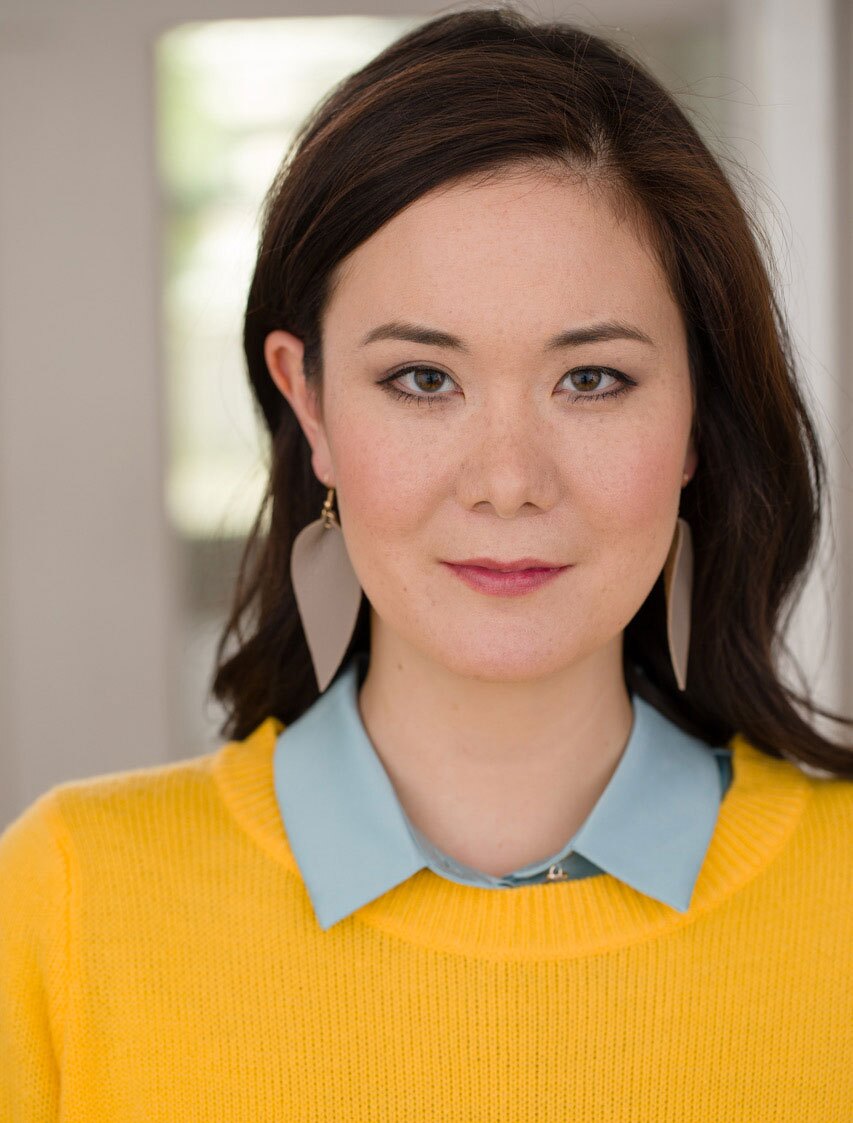Playwright Keiko Green is not based in San Diego, but it often feels like she is. She's built a creative home here, since studying playwriting at UC San Diego and returning often for both her own theatrical work and that of her husband, actor MJ Sieber.

Green's previous plays include "Exotic Deadly: Or the MSG Play," which premiered at The Old Globe, and Cygnet Theatre's "Sharon," in which Green also acted. Currently, Green is also a writer on the Apple TV+ series, "Margot's Got Money Troubles," which is in production.
Her latest play, "Empty Ride," was commissioned by The Old Globe and was first developed in last year's Powers New Voices Festival. The story follows Kisa, a young painter in Paris who returns home to a fishing village in Japan to care for her ailing father — and take over his taxi route. But while Kisa was living in Paris, the massive 2011 earthquake and tsunami ravaged the region and tragically killed her mother. Two years later, Kisa's grief has stabilized, but the guilt of not being home continues to fester.
"Yes, she missed it. She missed the tsunami. She wasn't there. There's an immense amount of survivor's guilt — and also she thinks that she's not defined by this hometown of hers," Green said.
The world premiere of "Empty Ride" opens Feb. 13 and runs through March 2. Green joined KPBS Midday Edition this week to discuss her work.
Interview highlights
On Ishinomaki, a tsunami-battered village in Japan
My Japanese grandma, my obasan, she passed away last year. She was 99 years old — lived a really long life. She lived in Sendai, which is right by Ishinomaki. So when the tsunami hit, my brother and I were both living in Brooklyn, and we met at this diner and I just remember having a cup of coffee and refresh, refresh, refresh, hitting that button trying to learn any information about how she might be doing.
When I went back to the area later, I was really impressed by how quickly they had rebuilt. And also, you can physically rebuild, but there's a heart that's a little bit missing.— Keiko Green
When I went back to the area later, I was really impressed by how quickly they had rebuilt. And also, you can physically rebuild, but there's a heart that's a little bit missing.
So, when my grandma was on her death bed last year, I made a trip back to Japan — and this was after we had done the the reading at The Old Globe, but I was able to go to Ishinomaki specifically with my mom and really talk to the people there about whether — I was kind of torn about whether writing a play about this area actually felt like exploitation or whether I was, hopefully, bringing light to something that people had forgotten about or not even known about.
I really got to talk to the people there and they were just so delighted that there was a story, that anybody was telling the story about their town outside of Ishinomaki.
On Kisa, darkness and survivor's guilt
When I watch theater or TV or films about Japanese people, I usually don't recognize the Japan that I know in those pieces of media. I always find them to be so just, quote, ‘honorable,' and the people that I know are just a little bit more, I don't know … darker and funnier and sillier. So Kisa has a real darkness to her.
She is on a journey of what does this town mean to me? Who am I even anymore? And what does it mean to survive? Like, what's my responsibility?— Keiko Green
Yes she missed it. She missed the tsunami. She wasn't there. There's an immense amount of survivor's guilt — and also she thinks that she's not defined by this hometown of hers. Her dad's ill and she goes home to take up her dad's taxi, and through that I think she is on a journey of what does this town mean to me? Who am I even anymore? And what does it mean to survive? Like, what's my responsibility?
For Kisa, her darkness really comes from a place of — you know, all of my characters are trying to figure something out, actively in front of us. So the darkness is never about sitting back and just feeling hard, it's more about they're trying to get to the bottom of something and they might not even know what that is yet. Which can also be really funny, because they're stumbling through and making all these mistakes. But, I think that's kind of the core of where her darkness comes from.
Any play I write, even the most serious ones, ends up really funny too. So there's always going to be that element to it. I do really write from a personal place. I write really quickly, because once I'm on to something, I can just pour it out — and worry about what stays or what is cut out later.

On feeling untethered in the world
Kisa is from this small fishing town and she just thinks that there's more to the world. For Kisa, there was something that the world was beckoning to her and so she left and she learned that other characters kind of did the same thing and felt the same thing.
But with that, she loses a part of herself and a huge part of this untethered international identity is something that I'm really interested in. I'm half Japanese. I grew up in Georgia. I went to a Japanese school when I was in Georgia, so I've always felt kind of stuck between two worlds where all of the kids I knew were Japanese, but I was living in this normal suburban block of houses.
My mom, she's a Japanese woman who left Japan and she is here in the U.S. She's been here for decades and she feels so American to me, in terms of her personality, and I wonder sometimes about whether she has adopted that because she moved here, or whether she kind of had to leave because she was a little bit too much.
The play is really exploring these people that feel like they're a little bit too much.
(My mom) feels so American to me ... and I wonder sometimes about whether she has adopted that because she moved here, or whether she had to leave because she was a little bit too much. The play is really exploring these people that feel like they're a little bit too much.— Keiko Green
On ghosts and empty rides
In Japan, being a taxi driver is a really respectable job. They have their white gloves, their taxis are immaculate and they're covered with lace. So there isn't quite the same judgment I think about that occupation in Japan.
Kuten literally means "empty ride." It's not like a famous word or anything. It's really just vocabulary in the taxi jargon — which I think is really great.
Every single taxi driver in the town has said that they've had a spirit passenger. When they speak about it, something that I find just so incredibly culturally specific and beautiful — which is this responsibility to try to take these people to their homes that were washed away or gone.— Keiko Green
And one interesting thing that I had found just by doing research was that 100% of the taxi drivers in Ishinomaki had reported that they had had a ghost passenger at some point. There's even an "Unsolved Mysteries" episode about this. They interviewed all these people and they talk about it pretty matter-of-factly. For a long time no one spoke of it at all, which I think is actually also very Japanese, but once people started sharing they were like, "Oh, yes." Every single taxi driver in the town has said that they've had a spirit passenger.
When they speak about it, something that I find just so incredibly culturally specific and beautiful — which is this responsibility to try to take these people to their homes that were washed away or gone. That is just, like, an image and a want that is so tragic and beautiful and a huge part of our play.
On speaking before thinking
I talk about this a lot with actors, and it can be a little bit tricky because I like to write characters that speak and act before they think.
The moment that actors start to put these really pregnant pauses into the dialogue, it starts to make everything they do seem deliberate. There's such a big difference between taking a big pause and hurting someone's feelings — and then just quickly hurting someone's feelings. Because the first thing is it means that you're intentionally trying to hurt another person versus kind of saying what you think and accidentally hurting that person's feelings.
And I think that the consequences of blurting something out and stumbling into these mistakes and having to recover from them is so much juicer. Most of my characters, yes, they're extremely flawed. They say the wrong things. They're trying their best.
Most of my characters, yes, they're extremely flawed. They say the wrong things. They're trying their best.— Keiko Green
On San Diego as a home for theater
I did go to grad school here, and my husband works here too. He's doing a show with Backyard Renaissance right now, so we're always in town.
I grew up in Georgia. I went to undergrad in New York, and then I lived in Seattle for seven years, and I felt like I was always kind of trying to find the place that felt like home to me. Right now, we're currently "paying rent" in L.A., I would say, because we're almost never there. Coming down here, it really kind of opened my eyes up again and just being able to go out and explore the world and kind of absorb that sunshine and put it into work. But also I was in Seattle, and I had really hit a ceiling in terms of my writing — not just in my skill, which is true, but also just in terms of getting my work out. They kind of make that joke of: You have to leave, you have to go to New York to be able to get produced there or get to work there.
When I came down to San Diego, it was UCSD which has a really prestigious MFA playwriting program, so that's part of it, but I was able to create community and find friends and artistic collaborators really quickly and easily. I really have felt like I've been able to fail here. And only through the failure can we really find our excellent work too.
I really have felt like I've been able to fail here. And only through the failure can we really find our excellent work too.— Keiko Green
The Old Globe isn't even associated with UC San Diego — that's just a connection that kind of came out and they've been so extremely supportive. They were the first big theater to really trust in my work and give me a commission, give me a huge production. So for me, San Diego will always have a sweet spot in my heart, because they told me that they believed in me and that's just something that you can't really forget.






